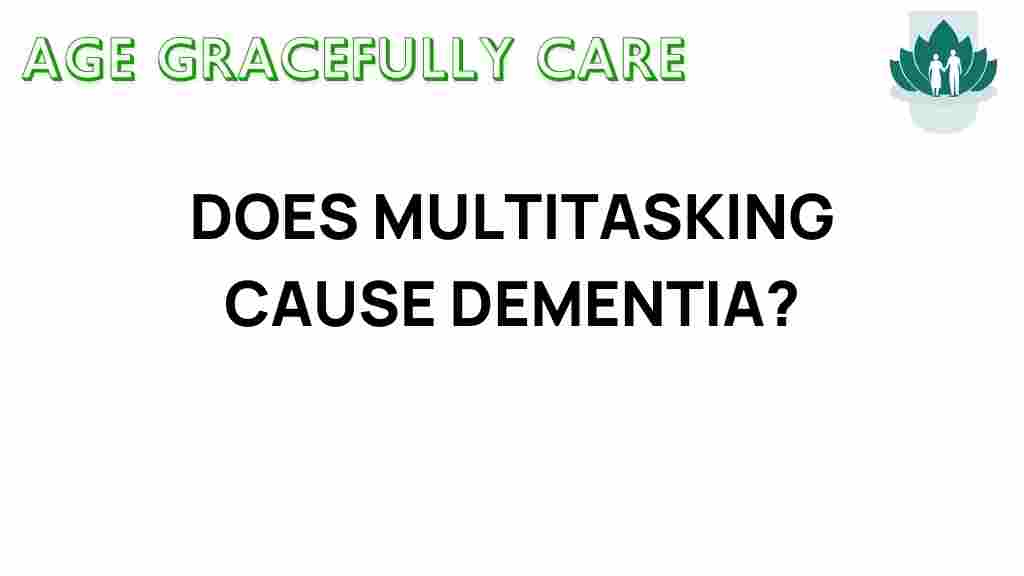The Surprising Link Between Multitasking and Dementia Risk
In our fast-paced world, multitasking has become a norm. We often pride ourselves on our ability to juggle numerous tasks at once, believing it enhances our productivity. However, emerging research highlights a concerning connection between multitasking and the risk of dementia. This article delves into the surprising link between multitasking, cognitive health, and the potential for neurodegeneration as we age.
Understanding Multitasking
Multitasking refers to the ability to perform multiple tasks simultaneously or switch between tasks quickly. While it may seem like a skill, studies indicate that our brains are not designed for multitasking. When we attempt to juggle several activities, we often experience a mental overload that can lead to decreased focus and impaired brain function.
The Cognitive Impact of Multitasking
Multitasking can adversely affect cognitive health in various ways:
- Reduced Attention Span: Constantly switching between tasks can diminish our attention span, making it harder to focus on any single task.
- Increased Stress Levels: Multitasking can lead to mental fatigue and stress, which can impact overall brain function.
- Memory Impairment: Engaging in multiple activities can hinder our ability to remember information, as our brains struggle to process everything at once.
The Link Between Multitasking and Dementia
The connection between multitasking and dementia risk is becoming clearer. Research suggests that chronic multitasking may contribute to cognitive decline and neurodegeneration as we age. Here’s how:
- Brain Function Decline: Studies indicate that excessive multitasking may accelerate brain function decline, particularly in older adults.
- Increased Neurodegeneration: The constant demand on cognitive resources can lead to neurodegenerative changes in the brain.
- Impact on Aging: Aging naturally decreases cognitive abilities; multitasking can exacerbate these effects, increasing dementia risk.
How Multitasking Affects Aging and Cognitive Health
Aging is often accompanied by a decline in cognitive function. When individuals engage in multitasking, they may inadvertently accelerate this decline. Here are some critical insights into how multitasking affects cognitive health in older adults:
- Impaired Executive Function: Multitasking can hinder executive functions like decision-making, problem-solving, and emotional regulation.
- Decreased Processing Speed: Older adults who frequently multitask may experience slower processing speeds, impacting their ability to perform daily activities.
- Social Isolation: The stress and mental overload from multitasking can lead to reduced social engagement, further impacting cognitive health.
Recognizing Mental Overload
Understanding mental overload is crucial for maintaining cognitive health. Here are some signs of mental overload due to multitasking:
- Difficulty concentrating on tasks
- Increased irritability or mood swings
- Frequent forgetfulness or memory lapses
- Physical symptoms like headaches or fatigue
Step-by-Step Process to Improve Focus and Productivity
To mitigate the risks associated with multitasking and promote better cognitive health, consider implementing the following steps:
1. Prioritize Tasks
Begin by listing your tasks for the day. Prioritize them based on urgency and importance. Focus on one task at a time to enhance productivity and reduce mental overload.
2. Use Time Blocks
Allocate specific time blocks for each task. For example, dedicate 25 minutes to a task followed by a 5-minute break (the Pomodoro Technique). This method can significantly improve focus and efficiency.
3. Minimize Distractions
Create a distraction-free environment. Turn off notifications on your devices, close unnecessary tabs, and find a quiet space to work.
4. Practice Mindfulness
Incorporate mindfulness practices into your routine. Mindfulness can enhance focus and reduce stress, improving overall cognitive health.
5. Regular Physical Activity
Engage in regular physical activity. Exercise has been shown to improve brain function and reduce the risk of neurodegeneration.
Troubleshooting Tips for Mental Overload
If you find yourself experiencing mental overload, here are some troubleshooting tips:
- Take Breaks: Step away from your tasks periodically to recharge your mind.
- Stay Hydrated: Drink plenty of water to maintain optimal brain function.
- Limit Caffeine: While caffeine can boost focus temporarily, excessive consumption can lead to increased anxiety and mental fatigue.
- Get Adequate Sleep: Ensure you are getting enough quality sleep, as it is essential for cognitive health.
Conclusion
In conclusion, the surprising link between multitasking and dementia risk highlights the importance of focusing on a single task at a time. As we age, maintaining cognitive health becomes increasingly vital, and the demands of multitasking can lead to mental overload and neurodegeneration. By implementing strategies to improve focus and productivity, we can protect our brain function and reduce the risk of dementia.
For more information on cognitive health and aging, consider exploring resources from reputable organizations like the Alzheimer’s Association. Remember, prioritizing mental well-being can lead to a healthier, more fulfilling life as we age.
This article is in the category Health and created by AgeGracefullyCare Team
